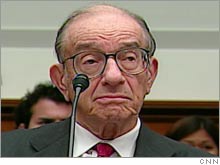 |
| Federal Reserve chairman Alan Greenspan testified before the House Committee on Financial Services on Wednesday. |
|
|
|
NEW YORK (CNN/Money) -
Alan Greenspan, chairman of the Federal Reserve, spoke favorably of the overall economy in Congressional testimony Wednesday, but warned investors about the risks of a housing bubble and fuel prices that are likely to keep rising for years.
"A further rise [in fuel prices] could cut materially into private spending and thus damp the rate of economic expansion," said Greenspan.
The chairman said that many oil-producing nations are politically unstable and that some of those countries are increasing their own needs for oil consumption, putting further pressure on export prices.
Rising oil prices are "likely to place some upward pressure on consumer prices, at least in the near term," said Greenspan.
Greenspan's comments on fuel prices are notably bearish, according to an analyst.
"Essentially, the energy prices outlook offers almost a lose, lose scenario," said Anthony Chan, senior economist for J.P. Morgan Asset Management. "Bad news for inflation if they rise and bad news for the economy if they rise too much."
Greenspan also warned that the "boom" in housing prices could reverse itself in certain geographical areas. "We certainly cannot rule out declines in home prices, especially in some local markets," said Greenspan, adding that there are "signs of froth in some local markets where home prices seem to have risen to unsustainable levels."
David Wyss, chief economist for Standards & Poor's, said that Greenspan and the Fed could control mortgage rates by increasing interest rates, and could also place restrictions on banks to get them to stop providing mortgages with no money down.
Wyss said these type of loans place risks on the economy by providing owners with houses "that they can't afford." "What do you do when [the owner] mails the key back to the bank?" said Wyss.
Some good news with a catch
Greenspan's overall comments on the economy were positive.
He said that employment has remained "on an upward trend" and retail spending "has posted appreciable gains, with "modest" inventory levels and "firmed" business investment.
He said that low long-term interest rates have "continued to provide a lift to housing activity."
"Thus our baseline outlook for the U.S. economy is one of sustained economic growth and contained inflation pressures," said Greenspan. "In our view, realizing this outcome will require the Federal Reserve to continue to remove monetary accommodation."
An analyst said that Greenspan's testimony was a warning to investors that hikes to the short-term interest rate, currently at 3.25 percent, are imminent.
"[Greenspan] believes that the economy will be brisk enough to require more in the way of rate hikes if inflation is to be contained," said John Lonski, chief economist for Moody's Investors Service. "At the same time, the Fed must be careful not to tighten so aggressively so that it does not risk bursting regional home price bubbles."
Lonski and Wyss expect the Federal Open Market Committee to increased the rate to 4 percent by year's end.
The Fed is scheduled to meet again on Aug. 9, and could decide to adjust the interest rate at that time. Greenspan's fifth term ends on Jan. 31, though there could be a short extension until his successor is confirmed.
For more stories on the economy, click here.

|